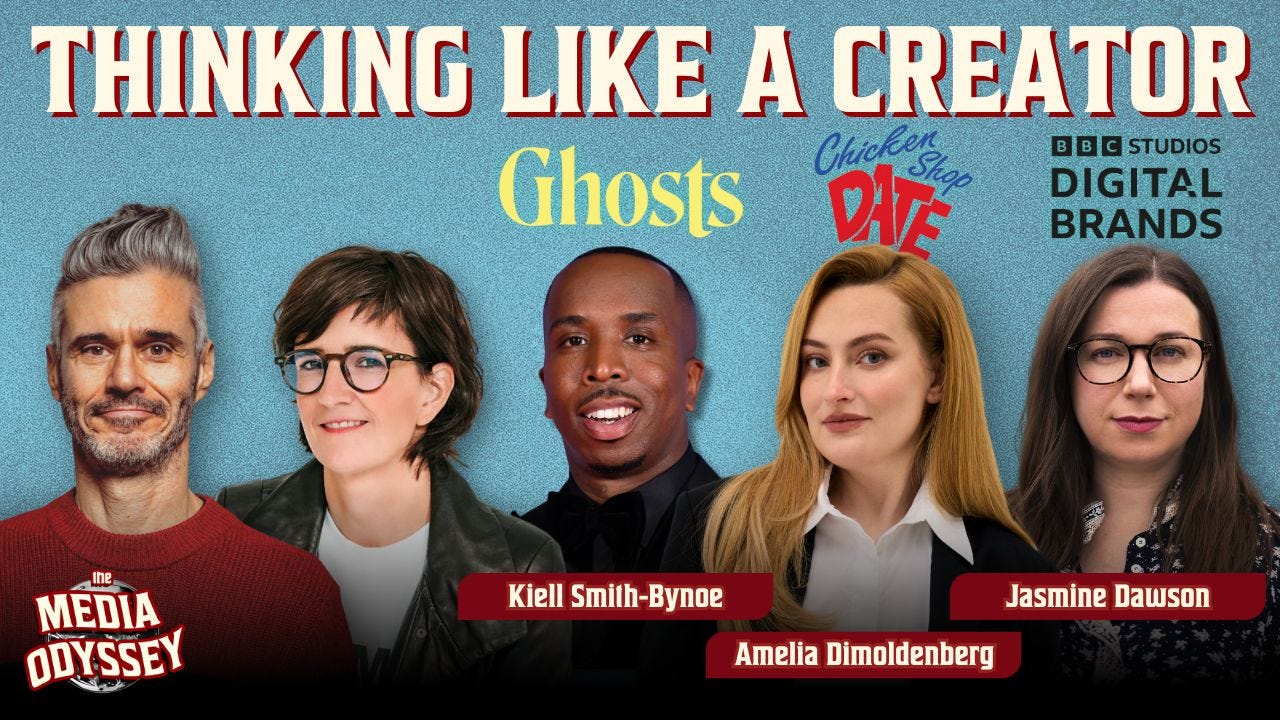Happy Thursday Peaceniks. Ready to talk?
In case you missed it, television is being reinvented. In significant part, this is due to Creators — but not always the kind of Creators that come to mind when I say “Creators.” While in Cannes, and I visited with three different kinds of Creators for a very special episode of The Media Odyssey Podcast — Creator Classic (the host of Chicken Shop Date); Actor-Creator (from Ghosts); and Studio Creator (the bloomin’ BBC).
LISTEN/WATCH | APPLE PODCASTS | YOUTUBE | SPOTIFY
Amelia Dimoldenberg is a “classic” Creator. She started Chicken Shop Date in her teens. She launched the YouTube show a decade ago. Since, Amelia and her Chicken Shop, along with Sean Evans and his Hot Ones, have reinvented the TV talk show for the YouTube Era. Amelia’s celebrity-interview-as-cheap-first-date series is a phenomena, landing her spots on countless covers and red carpets, a keynote at Cannes Lion, and big deals with brands — with whom she only works outside the show itself. Like many professional Creators, she thinks like a businessperson, because she is one. A savvy one.
Kiell Smith-Bynoe, who fishes for a date on her show at the end of that clip, is an actor on BBC’s hit TV show Ghosts. On the pod, he tells us why he also pursues Creator projects like his live comedy show Kool Story Bro, which just sold out at Edinburgh Fringe.
Amelia is one of many reasons that a billion hours of YouTube is watched, every day, on the Telly.
Another is an increasing number of big, more traditional Media brands leaning into the Creator Economy as a central part of their business model. None are more traditional a Media company, nor as it turns out, more aggressive a player in the Creator space, than BBC Studios — as described here by Jasmine Dawson, the brilliant exec leading BBC Studios’ digital efforts.
I’ve been speaking with BBC Studios for some time — learning the details of their impressive transformation from traditional Studio (under the umbrella of a very traditional Public Service Broadcaster) to a Creator Mindset business model.
In the first-ever conversation about this paradigm shift, Dawson — the chief architect of the strategy — speaks eloquently about the innumerable ways the reorientation towards Fandom-first changed how BBC Studios thinks about and measures themselves. To meet the moment in the User-Centric Era, BBC Studios adapted their definition of success from reach to engagement. The results kinda speak for themselves.
Their strategy and execution for Bluey — now the world’s most important kids title — epitomizes the “Studio as Creator” model.
BBC Studios curates their IP across every platform possible, to maximize Fandom. And if you think “Fandom” some squishy avoidance of accountability, you’re flat wrong. As Jasmine describes, BBC Studios breaks Fandom into measurable, tangible metrics, including Audience Sentiment, Watchtime, and User-Generated content volume. This is how Bluey — managed exclusively by BBC Studios — reached 10 million YouTube Subscribers while maintaining its place atop kids TV worldwide on Disney+ and other platforms. It’s also why — as Jasmine broke the news on the pod — the producers of the hit kids show Bing have given BBC Studios exclusive rights to manage the show across all digital channels worldwide.
As we learned in this exclusive chat, BBC Studios didn’t just pivot, they transformed. A lesson for traditional Media: They changed their KPIs for today’s models AND hired digital natives across content, distribution, and advertising. That’s how they operate 150 YouTube channels, how they increased revenues on YouTube (via their own sales team) 111% year-on-year, drove up view-time by 92% across their channels, and why they now play across 17 different languages and countless countries — with much further reach outside the UK.
Amelia and Chicken Shop Date prove what many of us have known for sometime: That Creators are the new Hollywood — on screen and off. BBC Studios offers a pitch-perfect case study for Big Media in the User-Centric Era: When major Studios follow the rules of the Creator Economy, they CAN make a business model out of the Creator Mindset — and become the biggest Creators on the block.
Whether you’re a Creator looking to behave more like a studio, or a Studio/Production Company looking to understand the Creator Economy, this is a podcast for you!
LISTEN/WATCH | APPLE PODCASTS | YOUTUBE | SPOTIFY
Enjoy the weekend!
ESHAP










Super interesting, I'll check out the podcast in a moment!